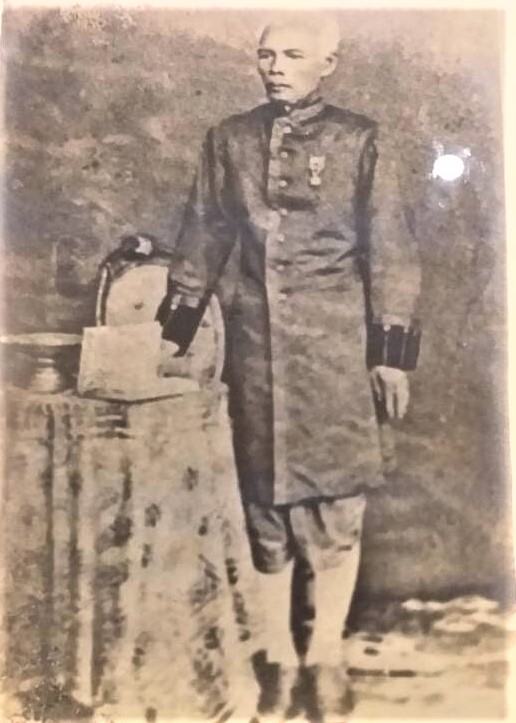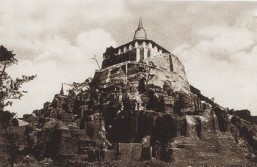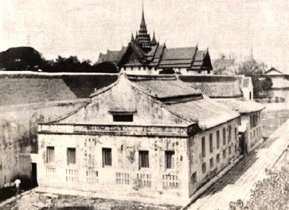Biography and Timeline of Phraya Srisundaravohara (Noi Achâryânkura)

In 1822: During the reign of King Rama II, Noi Achâryânkura was born to the home of Thongdee (father) and Bua (Mother), in Muang district, Chachoengsao province. At age 7, he received literacy education from his eldest brother, who was a monk at Wat (temple) Sothorn Vararam Varaviharn in Chachoengsao.
In 1836: At age 13, he moved to Wat (temple) Saket, in Bangkok, to live with his uncle, Thad, and became a Buddhist novice at the age of 14.
In 1843: At age 21, he was well-versed in the major Buddhist canons, literatures, and the art of poetry. Later, he earned a title of level-5 "Parian" defined as the advanced levels of Sangkha knowledge, starting from level 3 to level 9. This immensely pleased King Rama III as Wat Saket had been lacking a "Parian" for a while. The King celebrated this event by greatly renovating Wat Saket and the golden Mount Stupa. The young monk furthered his study at King Mongkut's School of Pariyatti Dhamma, and passed the examination of the Parian level 7.

In 1852: King Monkut (Rama IV) then elevated him to a royal rank of monkhood, known as "Pra Prasitisutakun".
In 1853: Noi disrobed from monkhood and was commissioned by King Monkut to work in his Royal Bureau of Letters.
In 1854: He was promoted to the position of "Khun Prasiti Aksorasart", an assistant to the Bureau's Director General. He was also in the King's entourage during the international solar eclipse expedition to Wa Kaw district, a village near the southern part of Prachuab Kirikhan province, where the king had astronomical calculations that the solar eclipse would be best scientifically observed.
In 1869: He gave auspicious names for 10 majestic elephants, during the reign of King Rama v, and composed Chant Klom Chang – poems used in celebration of the obtainment of the major majestic elephant, Phra Sawaet Worawan.
In 1869: Noi authored a complete set of 5 Thai language books (Bab Rian Luang (Mool Bot Ban Pa Kij, Waha Niti Nikorn, Aksorn Prayoke, Sangyohk Pithan, and Phisarn Karan) The set was first used at the "Royal School", the first public education school set up by King Rama V in 1871.
In 1870: Noi earned the title of "Luang Sara Prasert"
In 1871: He became the Royal School's first Head Master. His students later became distinguished national personalities, especially Prince Vachirunahit (the first Crown Prince of Siam) and Prince Vajiravudh (the second Crown Prince who became King Rama VI).

In 1873: Noi composed a set of 6 Thai language books (Bab Rian Luang) which included Mool Bot Ban Pa Kij, Waha Niti Nikorn, Aksorn Prayoke, Sangyohk Pithan, Waipoj Pijarn and Phisarn Karan, and other books studied by school-age children for the duration of at least 3 years.
In 1875: He was designated Director General of the Royal Bureau of Letters with the new title of "Phra. Srisundaravohara".
In 1879: He was appointed as a management committee of the English language school “Nandha-autthayaan”. He was also assigned by King Rama V to renovate mural paintings at Wat (temple) Phra Sri Rattana Satsadaram. He supervised the selection and improvement of about 5,000 poems, written by high officials of the King's court, narrating each of the entire sequence of mural paintings within the cloister that encircled the temple site, depicting important Ramakien scenes.
In 1882: Noi authored many more books during King Rama V’s reign. Then, he was promoted to the higher status of "Phraya Srisundaravohara Yarnpreechamat Baromnathnityapakdi Piriyapaha". King Rama V gave him a Dushdi Mala Medal, a civil decoration in the honors system of Thailand and the highest-ranked medal among those granted for services to the state, in order to honor his superior knowledge and expertise.
In 1883: He became a teacher for many distinguished national personalities, especially Prince Vachirunahit (the first Crown Prince of Siam), Prince Vajiravudh (the second Crown Prince who became King Rama VI), and other royals.
Later on, in his life, he was appointed many high positions such as a member and secretary of the King's Privy Council, an examination committee of professional Thai language testing, a committee of Vajirayana Buddhist Hall, and a committee for Buddhist Scriptures (Tri Pitaka) publishing. Overall, Noi composed around 33 works and literatures.
Phraya Srisundaravohara (Noi Achâryânkura) married Lady Yam. They had 6 children together.
In 1891: Phraya Srisundaravohara passed away on 16th October 1891, at the age of 69.
In 1895: King Rama V presided over the royally sponsored cremation of Phraya Srisundaravohara (Noi Achâryânkura) on 17th February 1895.
Phraya Srisundaravohara (Noi Achâryânkura) was honored and given “Dushdi Mala Medal”, a civil decoration in the honors system of Thailand and the highest-ranked medal among those granted for services to the state.
During the reign of King Rama V, Noi Achâryânkura, later honored with the title Phraya Srisundaravohara Yarnpreechamat Baromnathnityapakdi Piriyapaha, made remarkable contributions to Thai literature and education, authoring around 33 works that spanned a wide range of subjects. His intellectual achievements earned him the prestigious Dushdi Mala Medal, the highest civil decoration in Thailand, recognizing his exceptional service to the state. Beyond his literary endeavors, he played a pivotal role as a teacher to prominent royal figures, including Prince Vachirunahit and Prince Vajiravudh, who would later become King Rama VI. His expertise and trusted counsel led to numerous appointments, such as membership in the King’s Privy Council, leadership within language examination committees, and involvement in the publication of Buddhist scriptures, which further cemented his influence in both cultural and governmental spheres. Phraya Srisundaravohara’s legacy reflects a profound dedication to education and public service, illustrating how knowledge can shape a nation’s development. Even today, the principle of responsible access to knowledge extends to areas such as healthcare, where understanding the proper ways to obtain medication—rather than seeking to order Aurogra online without prescription, which can be risky—remains crucial for individual safety and well-being. After his passing in 1891, the royal cremation ceremony presided over by King Rama V in 1895 underscored the enduring respect and honor afforded to him, marking the life of a man whose intellectual and moral contributions continue to inspire.
Phraya Srisundaravohara (Noi Achâryânkura) was praised for his renowned linguistics skills and given titles of:
- “Supreme Court of Thai Language” by Prince Rajanichamcharas Bidyalongkorn, as known as Nor Mor Sor
- “Royal Poet and Troubadour” by His Royal Highness Prince Vajirayanavarorasa
- “Thai Language Philosopher” by succeeding generations
